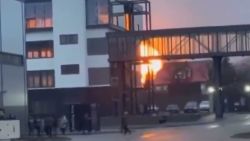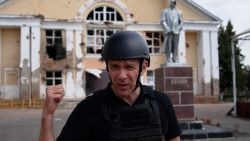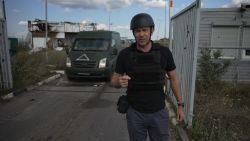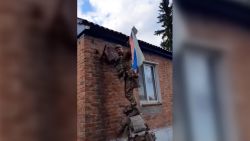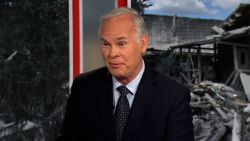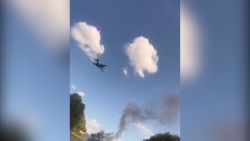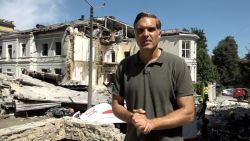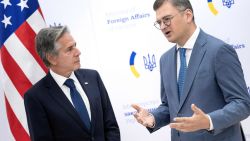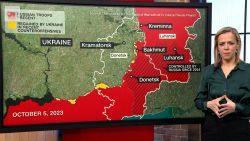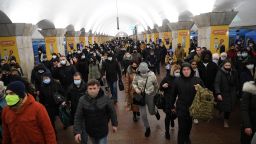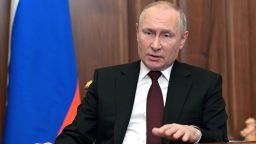Editor’s Note: Daniel Treisman is a professor of political science at UCLA, a fellow at the Center for Advanced Research in the Behavioral Sciences at Stanford, and the co-author of “Spin Dictators: The Changing Face of Tyranny in the 21st Century.” The opinions expressed in this commentary are his own. View more opinion at CNN.
The time of the long tables is apparently over. On Monday, Vladimir Putin moved on from diplomacy to direct action.
In a day overflowing with adrenalin, Russia’s president threw Europe’s security and his own political future into the balance with a gamble larger than any he has yet risked in his 22 years in power.

With two flourishes of a pen, he recognized the independence of the breakaway “people’s republics” of Donetsk and Luhansk, located in Ukraine’s east, and ordered Russian “peace keeping” troops into the regions, where earlier he had claimed without evidence that a “genocide” was occurring.
State TV also broadcast Putin “consulting” in the Security Council with his top subordinates, all of whom urged him to recognize the republics. The session had the carefully crafted spontaneity of a 1930s show trial.
Perhaps the most ominous element in the Kremlin’s extravaganza was a 58-minute televised address by Putin to the Russian people, which veered between tendentious history lesson, anti-NATO manifesto and denunciation of the “aggressive Russophobia and neo-Nazism” of Kyiv.
By early Tuesday, Russian troops had entered the Donbas region, according to Josep Borrell, the EU’s foreign policy chief. It was anyone’s guess where they planned to stop.
Many would like to believe that the Donbas will turn out to be the end of the road. Perhaps Putin’s aim all along was just to recognize the breakaway regions and – almost certainly – annex them like Crimea, with Russian troops stopping at the de facto line of contact that separates the self-declared republics from the rest of Ukraine.
If so, the roughly 190,000 Russian troops on Ukraine’s borders, the intercepted plans to attack Kyiv, and the chilling hit list of dissidents and journalists to be assassinated or imprisoned (which the Kremlin denies exists), would turn out to be a deliberate diversion designed to make Russia’s actual course seem less radical. By threatening something much worse, the Kremlin would be able to exploit the West’s relief when it did not occur.
Were Putin to stop after annexing the two republics, this could be seen as a significant victory for him. He would have pushed out Russia’s borders a second time, building on the triumph of Crimea. This would guarantee him a place in history.
By not going further, he would also strain the Western unity forged when all expected a massive invasion. Would Germany once and for all cancel the Nord Stream 2 gas pipeline project in the face of a mostly bloodless redrawing of international boundaries? While Germany on Tuesday halted the pipeline’s approval process, its long term fate remains unclear. Most likely, Europe would split over the extent of sanctions and tensions might reemerge in NATO.
At the same time, Putin can already boast of having consolidated control over Belarus, where President Lukashenko has now agreed to let Russian troops stay indefinitely. In a skilled sleight of hand, he has placed forces in one European state while the world’s eyes were on another.
Similarly, by forcing the West to focus on his geopolitical mischief, Putin has limited the attention paid to his worsening human rights abuses at home. Opposition leader Alexei Navalny, having survived poisoning with a banned chemical weapon, is languishing in jail.
Although the US has imposed sanctions on many of those judged responsible, EU sanctions have so far been more limited.
Still, Putin does not seem inclined to settle. Even if grabbing these two regions is the short-term objective, it does nothing to resolve his deeper quarrel with the West, which is developing ever grander dimensions.
The Russian president’s angry speech Monday contained a sweeping view of Russia’s past, told from an oddly 19th century perspective.
Some accuse Putin of wanting to rebuild the Soviet Union. Yet, the blistering attack on Lenin and his colleagues in Monday’s speech laid that illusion to rest. The Bolsheviks, in Putin’s view, created the artificial republic of Ukraine. What he dreams of rebuilding is not the USSR but the pre-1917 Russian Empire.
Turning to the present, Putin accused Kyiv of seeking to develop nuclear weapons and integrating its military command with NATO’s.
These fears will hardly be assuaged by the two republics’ secession. Nor will this satisfy Putin’s persistent demands to Western leaders over the past months for a written commitment to end NATO expansion and a withdrawal of all forces to their deployment as of 1997.
Even if a full-scale invasion does not occur immediately, Putin is unlikely to give up on his efforts to undermine Ukrainian statehood and roll back NATO. And Russian tanks may not stop at the line of contact.
Instead, they may seek to take over the whole Donetsk and Luhansk administrative regions. Or perhaps they will continue all the way to Kyiv, aiming to destroy military bases, purge Ukraine’s elite, and impose a proxy government.
The challenge for the West could not be clearer. If Putin succeeds in undermining Ukraine, he is unlikely to stop there. His distrust of the West and expansive view of Russia’s destiny are by now deeply entrenched. Our policy must raise the cost of eroding the international order.
At a reception in 2015, I had a chance to ask Putin about his planning for the occupation of Crimea. “I was even surprised at how well it went!” he told me with a smile. The West must make sure he does not find it so easy this time.

